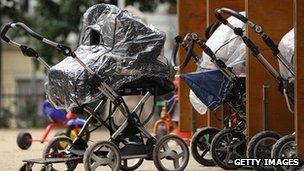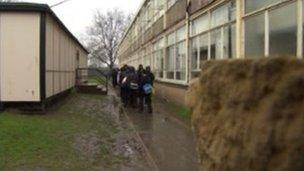School place shortage 'may hit quality of education'
- Published

A surging birth rate has seen primary schools under pressure to expand
The quality of children's education may be affected by the dramatic rush to find 250,000 primary school places in England by September 2013, MPs say.
The Commons Public Accounts Committee said central and local government failed to react fast enough to the dramatic rise in demand for primary school places in England.
The Department for Education says councils are on target to deliver them.
But the report says it may mean poorly performing schools expanding.
It says: "The department does not sufficiently understand the risks to children's learning and development that may arise as authorities strain the sinews of the school estate to deliver enough places.
"The imperative to increase the quantity of school places should not be achieved at the expense of quality."
'Squeeze areas'
And it highlights how Ofsted has expressed concerns about the impact overcrowding and poorly maintained buildings are having on educational standards.
Committee chairman Margaret Hodge warns: "What is also being lost in all of this is the effect that different ways of providing new places might have on pupils' learning.
"It does not take much imagination to realise that educational opportunities and standards might be diminished if specialist areas, such as music rooms and libraries, are converted into classrooms, poorly performing schools expanded, or playgrounds used to house children in overcrowded [temporary structures]."
The committee stresses that although legally it is down to local authorities to ensure there are sufficient school places locally, the Department for Education is responsible for providing capital funds and strategic oversight.
It said: "The number of children entering reception classes has been rising for some years, putting pressure on school places with greater stress falling on particular local authority areas where population growth has accelerated.
"Neither the Department nor local authorities anticipated how much and where pupil numbers were rising early enough and therefore failed to adequately plan for the increased demand.
"As a result the number of children in infant classes of more than 30 has more than doubled in the last five years and 20% of primary schools were full or over capacity in May 2012."
But the committee points out that although England's birth rate began to rise in 2001, that was not reflected in figures from the Office for National Statistics, on which DfE forecasts are based, until 2008.
The report added that the funding was coming out of a significantly reduced capital pot, adding that this was also being used "to maintain the fabric and condition of school buildings".

Temporary classrooms are a feature of schools in squeezed areas
The report also highlighted the impact that the government's policies of creating free schools and academies was having on councils' ability to respond to the demand for school places.
It said: "Local authorities can direct maintained schools to expand or close depending on fluctuations in demand in their local area. They do not have this power over academies or free schools, nor can they create schools that are not academies or free schools."
'Spending doubled'
Local authorities needed to have mature discussions with all parties, including academies and free schools, to resolve any mismatch between demand and supply for their communities as a whole," the report said.
"We hope that discussions at local level always prove successful, but the department needs to be clear about how it will achieve the best value-for-money solutions in the event that local discussions fail to achieve a resolution.
"This has to be in the context that free schools and academies are directly accountable to central government, but the government has no mechanism to force them to expand to meet the demand for school places," it concluded.
Schools Minister David Laws said: "Margaret Hodge is right that there is a severe need to ensure there are enough school places but she has failed to pin the blame where it belongs - at the door of the last government of which she was a member.
"Her report correctly states that the department 'failed to adequately plan' for the rising population, but does not explain that the responsibility for this failure lies with the previous schools secretary, Ed Balls, who ignored the rising birth rates reported by the ONS."
He said that the government had more than doubled spending on new school places compared with the previous government.
The government announced on Thursday that as a result of the Spending Review, it would be spending £7.5bn creating 500,000 additional school places by 2021. This was on top of the £5bn that would have been spent by 2015.
- Published12 March 2013
- Published15 March 2013
- Published11 May 2013